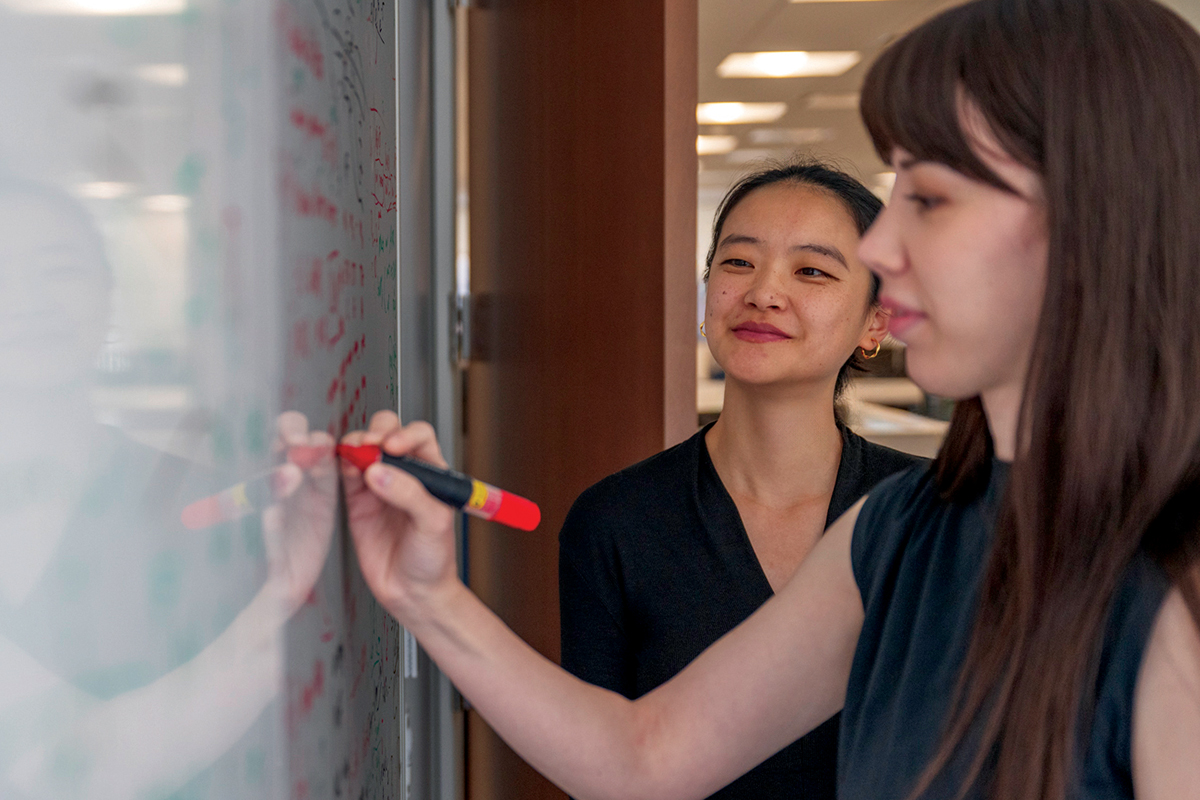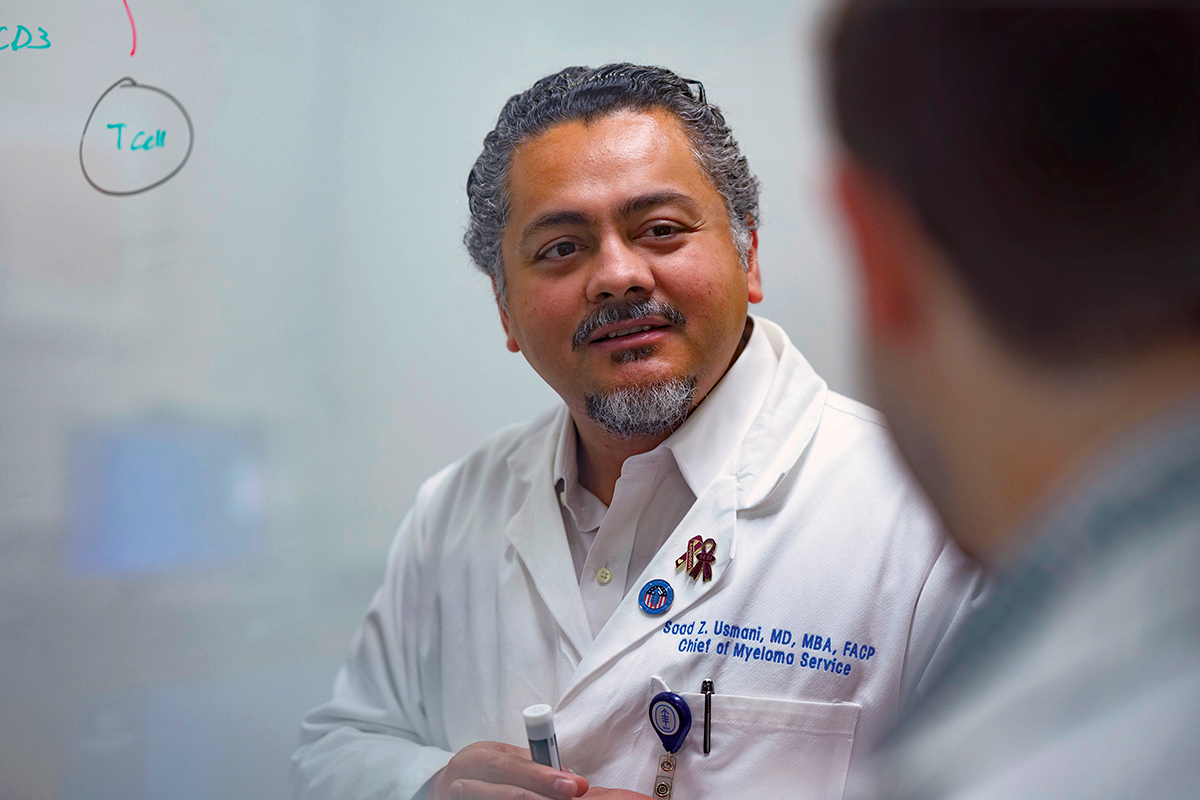
There is an urgent need to recruit more diverse patients into cancer clinical trials. One reason it’s so important is that researchers are learning that certain types of cancer occur more frequently in people with certain ancestries. For example:
- African — people of African ancestry are more likely to develop multiple myeloma, prostate cancer, triple-negative breast cancer, and uterine (endometrial) cancer.
- East Asian — people of East Asian ancestry have higher rates of stomach (gastric) cancer and certain head and neck cancers.
- Hispanic — people of Hispanic ancestry have faster-rising rates of early-onset colorectal cancer.
“With certain types of cancer, we know there is an overrepresentation in certain populations,” says gynecologic oncologist Paul Sabbatini, MD, Senior Vice President for Clinical Research at MSK. “But it doesn’t match up with the participation we see in clinical trials.”
Nearly every cancer drug that’s given to patients today exists thanks to clinical trials. “It’s so important for the population of trial participants to have the same representation as the patients who will receive the treatment later,” Dr. Sabbatini explains. “Treatments may not work the same way in every group, or they may have different side effects. We won’t know that if we don’t include these patients in trials.”
Efforts To Recruit More Black Patients to Multiple Myeloma Clinical Trials
As a trial attorney in New York City and a self-described warrior, Gail Goode is used to confronting adversaries. But without a doubt, multiple myeloma has been her most challenging opponent. After receiving a stem cell transplant, the cancer returned less than a year later. “I couldn’t believe I had to go through more treatment,” Gail says.
Multiple myeloma is a blood cancer that unfortunately takes a disproportionate toll on people who are Black. In fact, Black people are more than twice as likely to develop the disease as non-Hispanic white people, despite the latest treatments available at MSK.
Experts are not sure why. To learn more, myeloma specialist and cellular therapist Saad Usmani, MD, is focused on making sure clinical trials of new multiple myeloma treatments include patients from a variety of ancestries. “One in five people diagnosed with multiple myeloma in the United States are Black, but only about 1 in 20 people enrolled in myeloma clinical trials are Black,” says Dr. Usmani, who is Chief of the Multiple Myeloma Service at Memorial Sloan Kettering Cancer Center (MSK).
“If we’re not enrolling these patients in clinical trials and we’re not studying their specimens,” he asks, “how can we truly understand what’s happening in this disease?”
Understanding Genetic Differences Across Ancestry Groups
Environmental factors and socioeconomic status certainly play a part, but a key reason why some cancers hit certain populations harder is genetics. In an era of personalized medicine, a patient’s treatment is often based on the genetic mutations driving their cancer. But these mutations have not been studied as much in people with diverse ancestries.
MSK computational geneticist Jian Carrot-Zhang, PhD, had an “aha!” moment in graduate school that shaped her future research. She was studying a Canadian Inuit family with a widespread history of cancer that couldn’t be explained by any known hereditary cancer genes. “I realized the databases used to study cancer genes contain mostly data from people of European ancestry,” she says. “By not including other groups, we are missing a lot.”

Now Dr. Carrot-Zhang leads a lab that studies how specific genes found across ancestry groups influence the aggressiveness of cancer and its response to treatment. Recent research she published in Cancer Cell found that people of African ancestry have distinct mutations in a range of well-known cancer genes, including KRAS, EGFR, and ROS1. And these mutations potentially could impact the effectiveness of drugs that target these genes.
Other MSK investigators are on the same quest, led by Carol Brown, MD, Senior Vice President and Chief Health Equity Officer. To understand why endometrial cancer is deadlier in Black women than white, a recent MSK study found that Black women not only have more aggressive tumor types but also certain genetic factors that make their cancers more difficult to treat.
The Mystery of Why Myeloma Affects Black Patients More Frequently
For multiple myeloma, any specific genes that might lead to differences across ancestry groups are still unknown. “We don’t know why multiple myeloma is more common in people of African ancestry because we just don’t have enough data,” Dr. Usmani says. “That’s why it’s so important that more diverse patients be included in multiple myeloma trials.”
Gail jumped at the opportunity to join Dr. Usmani’s trial, saying now, “Participating in this trial was the best thing to happen to me.”

The early-phase trial is testing a combination of two drugs for multiple myeloma: an immunotherapy known as a checkpoint inhibitor, along with teclistamab (Tecvayli®), which is a bispecific antibody. The drug is engineered to deliver immune cells directly to cancer cells to destroy them.
Gail started the treatment in the fall of 2022. Today, she has no signs of cancer — and she’s still practicing law, recently taking a job at a private firm after decades of working for city agencies.
Because Gail’s multiple myeloma was very aggressive, Dr. Usmani says it’s truly remarkable that the treatment has been so effective for so long. “This kind of response may suggest something positive for other Black myeloma patients in the future,” says Dr. Usmani, who is sharing his data with the International Myeloma Working Group. He is also partnering with the International Myeloma Foundation to reduce inequities in treatment in the Black community.
Gail remains on the trial, receiving treatments every two weeks. In the beginning, she was susceptible to respiratory infections and had a persistent cough. But now she’s back to enjoying life with her husband and feeding her passion for stylish clothing from her favorite vintage stores. She says she feels great.
“I have a good team, and I feel like they really listen to me,” she says. “If this research can help other folks, that’s wonderful.”
How MSK Recruits Diverse Patients for Clinical Trials
Although participation rates in clinical trials are generally lower among members of certain ancestry groups, at MSK that is not the case. Once they become MSK patients, people of all genetic ancestries participate in clinical trials at the same rate.
MSK’s Office of Health Equity oversees several outreach efforts to help patients enroll in trials, including:
- Partnering with NYC Health + Hospitals to help their patients get access to clinical trials.
- Offering the MSK-IMPACT® test to determine if patients from these hospitals could benefit from an MSK clinical trial.
- Expanding clinical trials at MSK regional sites, especially at MSK Nassau on Long Island.
- Creating programs that make participation easier, such as travel expense reimbursement.
“I think MSK does an excellent job at recruiting patients into trials,” Dr. Brown says. “We should feel very proud about how we approach patients about participating and how we support them throughout those trials.”


